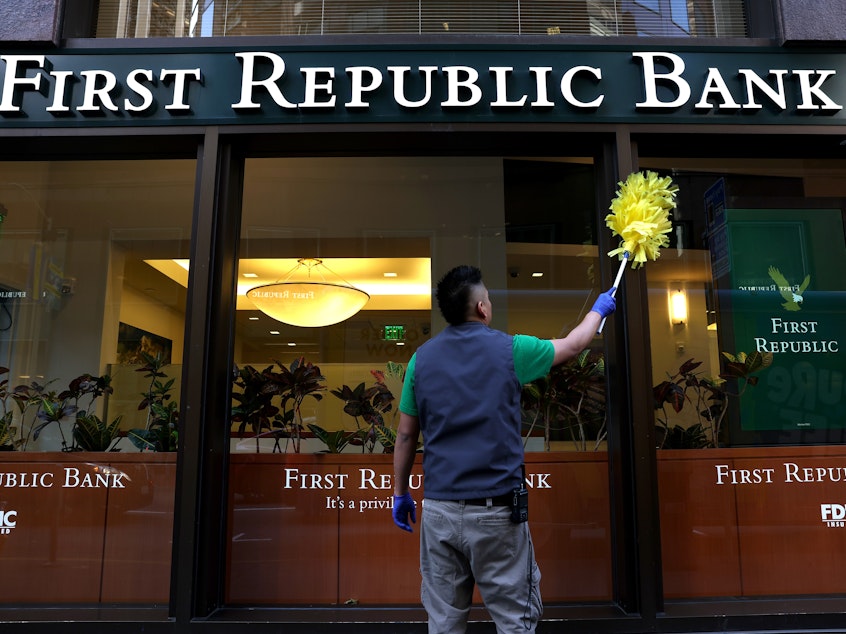JPMorgan Chase buys troubled First Republic Bank after U.S. government takeover

JPMorgan Chase has bought failed First Republic Bank's deposits and a "substantial amount of their assets and certain liabilities," JPMorgan Chase said in a press release Monday.
The purchase caps a rocky week for First Republic, which is based in California and has locations in eight states. Its stock tumbled so much last week that the New York Stock Exchange halted trading several dozen times.
Updated May 1, 2023 at 9:31 AM ET
The Federal Deposit Insurance Corporation (FDIC) briefly took control of it over the weekend, before overseeing the sale in what it describes as a competitive bidding process.
"Our government invited us and others to step up, and we did," JPMorgan Chase CEO Jamie Dimon said in a statement. "This acquisition modestly benefits our company overall, it is accretive to shareholders, it helps further advance our wealth strategy, and it is complementary to our existing franchise."
Sponsored
According to JPMorgan, First Republic's 84 branches are opening as JPMorgan Chase Bank branches on Monday and depositors have full access to their money.
First Republic is the third — and largest — U.S. lender to fail this year. Yet federal regulators say it is not a sign of wider problems in the banking industry.
"Americans should feel confident in the safety of their deposits and the ability of the banking system to fulfill its essential function of providing credit to businesses and families," according to a U.S. Treasury spokesperson.
That's something Dimon echoed in comments he made to reporters after the deal was announced.
"The system is very, very sound," he said.
Sponsored
JPMorgan is the biggest bank in the country. Its longtime CEO pushed back when questioned by reporters about further consolidation in banking.
"There will always be a need for good, strong community banks," Dimon said.
He noted the bank made its bid in a way that will "minimize costs" to the FDIC's Deposit Insurance Fund. The FDIC estimates this will cost that fund about $13 billion.
The acquisition includes the "assumption of approximately $92 billion of deposits" and the "acquisition of the substantial majority of First Republic Bank's assets, including approximately $173 billion of loans and approximately $30 billion of securities," JPMorgan said.
First Republic's failure comes after collapses of Silicon Valley Bank and Signature Bank in March
Sponsored
In March, federal regulators swept in to protect customers of Silicon Valley Bank and Signature Bank. Citing potential risk to the broader financial system, they took unprecedented action to insure all deposits at the two banks — even deposits that exceeded the FDIC's $250,000 threshold for insurance.
The government protected bank customers, but it didn't bail out shareholders who were wiped out.
After Silicon Valley Bank and Signature Bank were taken into receivership, the FDIC solicited bids to buy the two lenders. A subsidiary of New York Community Bank bought most of Signature Bank, and First Citizens Bank acquired Silicon Valley Bank.
The twin failures of Silicon Valley Bank and Signature Bank threatened to spark more bank runs. By and large, deposits have stabilized, according to recent earnings reports.
"That fear, that mass exodus that people were concerned about just didn't happen," says Jared Shaw, a bank analyst at Wells Fargo Securities, who notes lenders were proactive.
Sponsored
"One of the things that the banks did a great job with was reaching out to their customers, explaining their balance sheets, and explaining where their liquidity comes from."
That seemed to calm nervous customers and investors. First Republic was the exception.
"That deposit pressure was worse than expected," Shaw says.
In a note to clients, UBS analyst Erika Najarian predicted the news of JPMorgan's purchase will bring more calm to the banking sector.
"This deal does not change the rates, recession, and regulatory headwinds that regional banks are facing," she wrote. "But, we think this elegant solution should lay to rest outstanding investor concerns on liquidity."
Sponsored
First Republic shares tumbled last week
First Republic's death spiral began in earnest last Monday, when it announced that it had lost $100 billion worth of deposits during the first three months of the year.
On Friday, shares closed at $3.51 — down more than 97% year to date.
The San Francisco-based bank, which was founded in 1985, mostly catered to wealthy clients, offering home mortgages and commercial loans.
First Republic first came under intense scrutiny after Silicon Valley Bank and Signature Bank collapsed. Yet 11 of the country's biggest banks, led by JPMorgan, threw First Republic a lifeline when they deposited $30 billion in it.
Those moves ultimately failed to convince Wall Street, and customers continued to withdraw their money.
First Republic attempted to sell itself but found few takers, leaving a government-led rescue as the only available option. The FDIC asked several banks to consider placing bids.
The FDIC actions come as regulators themselves have been under scrutiny about whether they could have done more to prevent the failures of Silicon Valley Bank and Signature Bank.
On Friday, the Federal Reserve and the FDIC issued reports on what led to the collapses of those two lenders. They blamed management while admitting they could have done more to oversee the banks.
The FDIC is scheduled to release another report on Monday, on proposed changes to the deposit insurance fund. [Copyright 2023 NPR]



